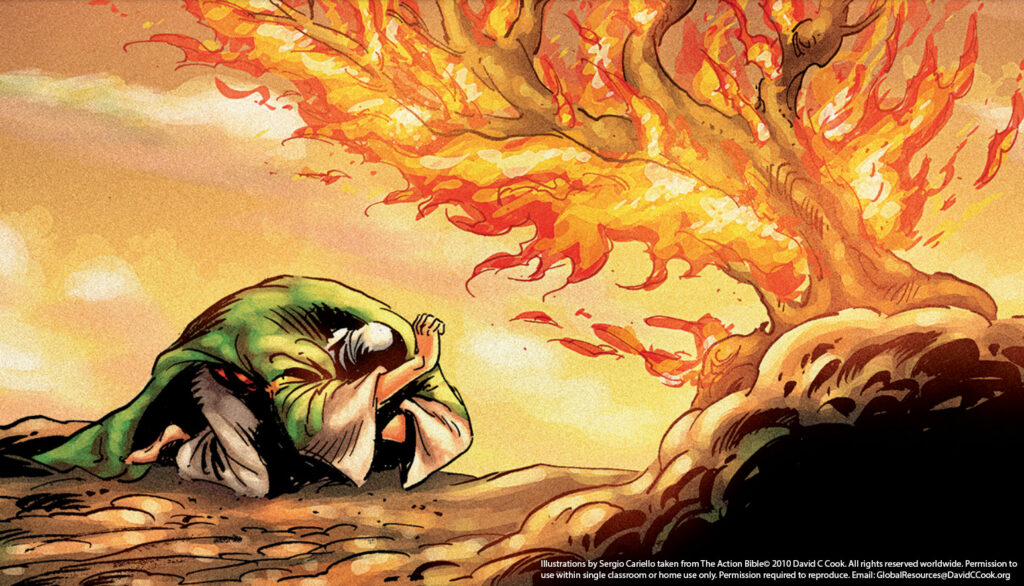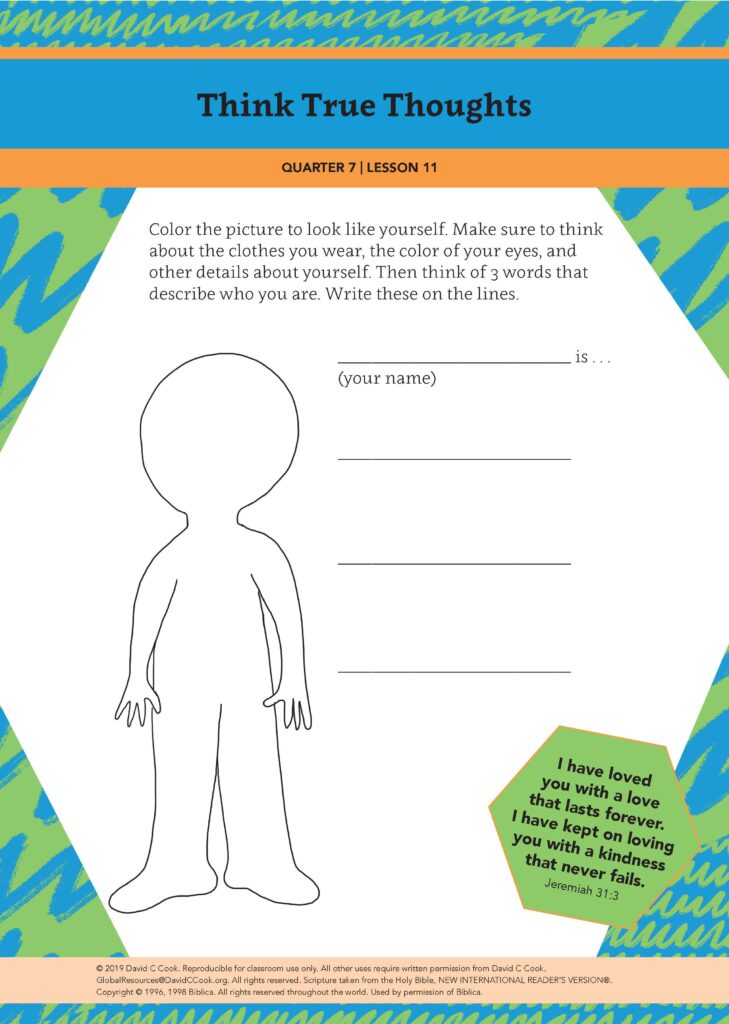During the lesson, the information for you to know is written in regular type, and what we suggest speaking or reading aloud to children is in bold. All resources for this lesson, including the Teacher Guide, Student Page, Family Connection Card, and other resources can be downloaded in a ZIP file by clicking on the following link:
In some lessons you will find "resource articles." These are articles written by experts from around the world to help equip you for your work with children and adolescents. Share them with parents or guardians if you consider it appropriate.
But God chose you to be his people. You are royal priests.
You are a holy nation. You are God’s special treasure.
You are all these things so that you can give him praise.
God brought you out of darkness into his wonderful light.
1 Peter 2:9
Who are you?
How would you answer this question? You might say, “I am a teacher” or “I am a parent” or “I am someone’s child.” We often define ourselves by what we do. Throughout our lives, many factors shape our identity—who we believe we are. Our experiences, choices, family members, and friends each play a role in shaping our identities. But our belief in Jesus changes our identities forever. He brings us out of darkness into His wonderful light!
When you begin to understand your identity as a child of God, you may also begin to see how much you are capable of doing. You are more important and valuable than you could possibly understand. You no longer need to be controlled by fear, hate, or shame. As you get to know your Saviour better, are you willing to allow Him to renew your mind and ways of thinking? You no longer need to listen to thoughts that might spring into your head to tell you about all of the things you have done wrong. Instead, these thoughts can be replaced by the voice of God telling you all of the wonderful plans He has for you and how much He values you. He loves you. You are His chosen child whom He treasures. The next time you think about all of the negative things you do or have done, try to see yourself the way God sees you, and know you are His!
Encourage families to name 1 thing they really like about each family member. This could be something the person does or a way the person acts.
Teacher Tip: If possible, email or text the Family Connection Card to the families of your students.
Greet the children as they come to class. As each child enters, ask him to name 1 way he served someone during the past week. If you have a very large group, you may instead choose to ask each child to share this with another child.
Today, we will begin by finding out some things that are true about us! When I say a statement, stand up if it is true of you.
The things that are true about you make up your identity. These are the qualities that make you who you are. God created you to be unique, which means there is no one else like you. He also made you an important part of your community.
You may remember learning that when we have negative thoughts, they build a pathway in our brains that makes it easier to have negative thoughts again. This is also true about the thoughts we choose to think about ourselves. Listen to the following situations. After I read each one, I will ask you what the child may be thinking about himself or herself.
Kevin gets most of the answers wrong on his math homework and only a few correct answers. What does he think about himself?
Anna’s friend stops playing with her and plays with someone else instead. What does she think about herself?
Peter misses the goal when he kicks the ball and his team loses the game.
Mercy’s father has left her family and is not coming back.
Sometimes when we face challenges or bad things happen it is easy to have negative thoughts, such as “I cannot do it,” “I am not smart,” or “It is all my fault.” These feelings are not true. Do you remember our verse from a few weeks ago? Listen to the first part of Philippians 4:8: “always think about what is true.”
God does not want us to believe lies about ourselves. He wants us to believe the truth. You may remember that we talked about how thoughts are powerful and how God wants us to think about good things.
Answers include: Smile. Look for the good in a situation. Say what you’re thankful for. Pray to God.
Let’s talk about how you can choose to think true things about yourself.
Optional: If possible, share the image from The Action Bible.

Listen to this true story from the Bible about Moses. God spoke to Moses in a burning bush. God told Moses to lead His people out of Egypt. Here is what happened next:
Read this verse directly from your Bible.
But Moses spoke to God. “Who am I that I should go to Pharaoh?” he said. “Who am I that I should bring the Israelites out of Egypt?”
Exodus 3:11
But Moses still wondered how he could possibly show the people of Israel that God had sent Him. God told Moses to explain that “I Am” had sent him. God gave Moses specific instructions and information he needed to lead God’s people out of Egypt. Moses responded by asking God what he should do if the elders of Israel did not believe him or listen to him.
God gave Moses signs to perform to show the people that God sent him. But Moses still worried that he would not be able to lead God’s people out of Egypt. The Bible says:
Moses spoke to the Lord. He said, “Lord, I’ve never been a good speaker. And I haven’t gotten any better since you spoke to me. I don’t speak very well at all.”
Exodus 4:10
Optional: If you are using The Action Bible, read pages 123–124 to the children.
God explained that He would help Moses to speak and that He would have Moses’ brother, Aaron, help him. Moses went on to free God’s people from Egypt, and he became a respected leader among his people.
Allow 2–3 children to respond to each of the following questions.
Raise your hand if you have ever doubted that you could do something. What was it?
Raise your hand if you have ever been surprised by something you were able to do. What was it?
Let’s talk about what negative thoughts we might have about ourselves. Some of these thoughts may come from things we do not do well. Some may come from what others say to us. Some may come from difficult situations in our lives. For this activity, you do not need to share your answers with anyone. Just think to yourself about whether you have had a thought like this.
Jesus is Truth, so He uncovers lies. When we ask Jesus for help seeing through the darkness of our negative thoughts, He will help us to discover the truth about ourselves. Getting rid of the negative thoughts we have about ourselves will not solve our problem. We will continue to have negative thoughts unless we think about why those thoughts are there and pray for God to fill our minds with true thoughts.
The Bible tells us many true things about ourselves. God created you and knows you better than anyone on earth, including yourself! Also, God always speaks the truth. That is why you can trust that the things He says in the Bible are true. When you find that you are thinking mean or bad things about yourself, remember what God says in the Bible about you!
1. You are loved.
I have loved you with a love that lasts forever. I have kept on loving you with a kindness that never fails.
Jeremiah 31:3
God will love us forever.
Forever is a very long time! God will never stop loving you. When you start to think negative thoughts, give yourself a hug or take a moment to thank God for loving you. Give yourself a hug now. Know that you are loved by God!
2. You are a special treasure.
But God chose you to be his people. You are royal priests. You are a holy nation. You are God’s special treasure. You are all these things so that you can give him praise. God brought you out of darkness into his wonderful light.
1 Peter 2:9
When you choose to follow God, you become set apart. That means that you become one of God’s people. You are a treasure. Think about what treasure is.
Answers may include: shiny, valuable, expensive, beautiful, and special.
The verse we just read tells us we are God’s treasure. We are so special to Him that He sent His Son to die and bring light to the world so that we could choose to be part of His family. He loves us that much!
3. You are wonderfully made.
How you made me is amazing and wonderful. I praise you for that.
What you have done is wonderful. I know that very well.
Psalm 139:14
God made you! He thought about who you would be before you were born. Let’s raise our hands up to the sky as we thank God for making us amazing and wonderful. Repeat this quick prayer: “Thank You, God, for making me in wonderful ways!”
These are only a few of the truths we learn about ourselves in the Bible. There are many more! We can choose to believe the truth instead of the thoughts that come into our minds to make us feel sad, angry, and horrible about ourselves and our situations.
When you begin thinking that you do not have value or you feel hopeless, remember what God thinks of you! Knowing the truth about how you were created and that God has a purpose for you can help you to think good things about yourself. Let’s practice turning negative thoughts into positive ones.
Have the children sit in a circle with you.
Sometimes we face challenges at school, at home, or with friends that cause negative thoughts to come into our minds. As I read these thoughts, think about whether you have ever thought this way.
Many of you recognized something you have thought before. Let’s take one of these statements and talk about how we can change this into something true. For example, “I am not smart because I cannot do this.” You could say, “This is not easy, but I will keep trying.” You could also say, “I need more practice to get better at this.” You could even say, “I am not good at this, but I am really good at other things.”
Now, it is your turn! I will read a statement. When you think of something you could say to yourself that is positive, raise your hand.
Read a statement below. Pause for 15 seconds to give children time to think and raise their hands to answer. Choose 2–3 children to respond to each statement.
Choose one of the statements we just talked about or think of something negative you have thought to yourself. Pretend to write it on the stick I give you. When everyone has a stick, you will throw away your negative thoughts. Wait until I say, “Go” so that everyone can do this together.
Optional: If you have paper and crayons, have the children write or draw a negative thought. The children will tear up the paper to get rid of the negative thought instead of throwing away a stick. You may want to have 2–3 children help you pass out supplies to all of the children if you need to save time.
After you have passed out all of the sticks, give the last child 15 seconds to “write” on her stick.
Everyone stand up and turn around so you are facing out away from the circle. When you face challenges and negative thoughts come to your mind, choose to throw them away like these sticks. Ready? Go!
Fill yourself up with the truth of who God says you are: loved, a treasure, and wonderfully made. It may be hard at first to change your thinking and think about true things. Let’s repeat these truths now. I will say a sentence, and then you will repeat it.
Pause briefly after each sentence for the children to repeat it. Encourage them to say these truths loudly!
You are loved, you are a treasure, and you are wonderfully made! Our memory verse today reminds us to stay focused on the truth.
If you are using the Memory Verse Poster, show it to the students.
Finally, my brothers and sisters, always think about what is true. Think about what is noble, right and pure. Think about what is lovely and worthy of respect. If anything is excellent or worthy of praise, think about those kinds of things.
Philippians 4:8

Sing or chant this verse using the following motions. If you changed any of the motions in previous lessons, use the motions you created.
Add the following motions:
Have the children sing or chant the words and motions with you 3 times.
Optional: If you are using Student Pages, give the children crayons and allow 5 minutes for them to colour pictures of themselves. After 5 minutes, help the children write 3 words to describe themselves. If you have a way of displaying these words where all the children can see them, this would prevent you from repeating the spelling of each word.

When we have a hard time believing true things about ourselves, God will help us and remind us of who we are. Let’s close our eyes for a few minutes and thank God for these wonderful truths.
End class by saying this blessing, based on Jeremiah 31:3, over the children.
Blessing: May you know that God loves you. May you know God’s kindness, and may you show this to yourself.
Lead the children in singing this quarter’s song, if possible.
Life on Life ©2020 David C Cook. Reproducible for home or classroom use only. All other uses require written permission from David C Cook [email protected]. All rights reserved.